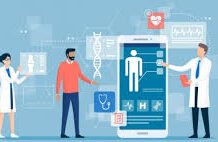Since the beginning of the 21st century, technology has rapidly advanced and transformed many parts of our lives for the better. Instead of using landline phones to call up family, you can use a small device that fits in your pocket to not only call them, but video chat as well.
Technological advances do just extend to phones; therapy has seen incredible benefits with the inclusion of smartphone apps that record an individual’s health record. Both mental health professionals and technology experts are combining their efforts to invent new, practical ideas that can help patients when they are not seeing a doctor in person.
Of course, the question of security may arise when talking about sharing personal data over the internet. Thankfully, there are helpful resources that can instruct you on bolstering your cybersecurity. But the mental health app should also keep their patient’s privacy in mind as well.
Thus, here are a few ways that technology is revolutionizing therapy.
The benefits of technology for therapy
In using apps, mobile devices, and other hardware for mental health purposes, patients can easily access their information and record their health accurately. Technology provides people the convenience of displaying their health information at any time.
Furthermore, there is a lower cost associated with health apps. For instance, online therapy may come at a cheaper price via various online venues compared to spending more money to see a therapist in person.
Along with affordable prices, utilizing online therapy on technology can provide services to people who live in rural areas. They may not have a stable form of transportation to see a doctor; however, they can use their phone and set up an online meeting.
Questions that need to be addressed
The benefits certainly show how technology can change the landscape of therapy forever. But there are various hurdles that need to be addressed.
First, people may have questions regarding the effectiveness and accuracy of using technology for any kind of therapy service. For therapy sessions that are only text-based, professionals may have a difficult time gauging a patient’s emotional state of mind from just text on a screen. Sometimes, video calls can mitigate this issue, but not everybody will have access to a stable internet connection.
While technology improves health care access in many ways, it is still important to remember that not everyone has access to devices or fast, reliable Internet.
Another significant challenge is ensuring a patient’s privacy. If companies are not careful with updating their security, they could experience breaches that jeopardize their customers’ personal information. To avoid these issues, there are various companies that focus solely on improving security and user experience for any kind of software, including mental health applications.
When looking for a therapist in person, an individual can research a mental health professional’s background before scheduling a meeting. The relationship with an online therapist is just as important and may need more time to build trust and make connections.
Popular mental health apps
Despite the hurdles that may need to be overcome, there are numerous existing helpful apps for the purposes of therapy.
One such example is self-management apps. These applications can help you record the necessary information for maintaining mental and physical health, such as keeping track of your heart rate, blood pressure, and feelings.
You can also make sure of skill training applications as well. These apps can test your processing skills and coordination through fun little games that gauge your memory and reaction times.
One more useful app is a type of passive symptom tracking program. You can record what kind of symptoms you feel. By collecting data on your health, you may discover that you have a chance of developing certain illnesses.
However, do not use apps to confirm a personal diagnosis. Instead, visit a doctor and ask them for their professional advice and possibly request an official diagnosis as well. Talking with a therapist about the information you learn could help move your sessions forward.
Technology has many uses, and mental health benefits greatly from applications. Use mental health technology in conjunction with seeing your doctor. In due time, you will be on top of your mental and physical wellbeing.








